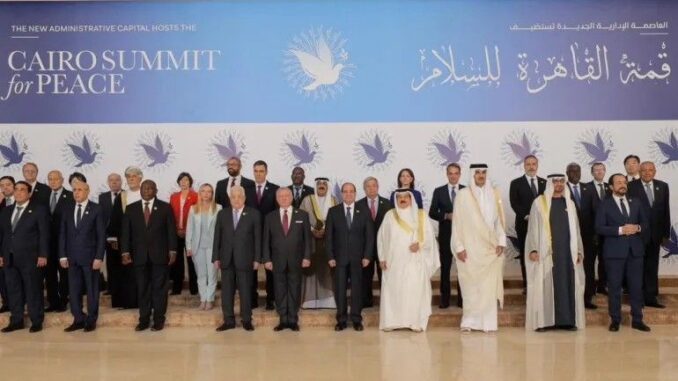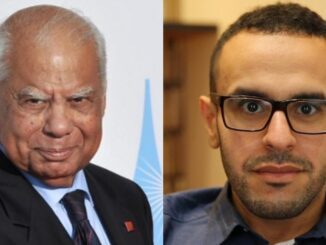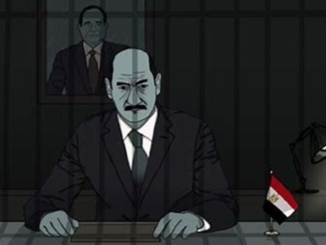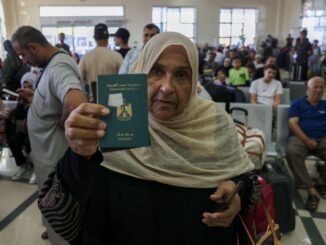
Under Israel’s continued airstrikes on Gaza for two weeks after Hamas’ attack on 7 October, about 5,000 Palestinians, including children, women, and elderly people, have been killed so far.
Leaders and top officials from more than a dozen countries have gathered in the Egyptian capital, Cairo, for a conference to discuss ways to “de-escalate” the Israeli war on Gaza, amid growing fears of a wider Middle East conflict.
Dubbed the Cairo Peace Summit, representatives from countries including Jordan, France, Germany, Russia, China, the United Kingdom, the United States, Qatar, Turkey, South Africa, and others, are attending the one-day meeting on Saturday, together with United Nations and European Union officials.
In his opening remarks, Egypt’s Abdel Fattah al-Sisi invited leaders to come to an agreement for a road map to end the humanitarian disaster in the Gaza Strip and revive a path to peace between Israel and the Palestinians.
The road map’s goals included the delivery of aid to Gaza and agreeing a ceasefire, followed by negotiations leading to a two-state solution, he said.
“All civilian lives matter,” Jordan’s King Abdullah said, addressing the summit. “The relentless bombing campaign under way in Gaza as we speak is cruel and unconscionable on every level. It is collective punishment of a besieged and helpless people. It is a flagrant violation of international humanitarian law. It is a war crime.”
“Anywhere else, attacking civilian infrastructure and deliberately starving an entire population of food, water, electricity and basic necessities would be condemned. Accountability would be enforced … but not in Gaza,” he added.
Palestinian President Mahmoud Abbas attended the summit and asked for humanitarian corridors to be opened. But the absence of any official from the Israeli side has dampened expectations for what the summit can achieve.
“While it is good for these countries to propose a road map out of this crisis, “Is Israel going to listen to that road map?,” wondered Al Jazeera’s diplomatic editor James Bays.
“Israel is not represented. It’s Israeli generals and the Israeli prime minister and the Israeli war cabinet who have the decisions on what to do militarily, and you see as the speeches have been going on, fresh bombardment of Gaza,” Bays noted.
The summit takes place as Israel readies a ground assault on Gaza, after weeks of aerial attacks, claiming the lives of thousands, following the October 7 attack by Hamas that reportedly killed killed 1,400 Israelis. About 5,000 Palestinians have been killed in Israel’s counteroffensive, amid a growing humanitarian crisis in Gaza.
Egypt called for the international conference last week to discuss the “developments and future of the Palestinian cause”. Egyptian Foreign Minister Sameh Shoukry said the meeting would seek an “international concurrence” on the need for de-escalation and humanitarian aid deliveries to the Gaza Strip.
The Rafah border crossing between Gaza and Egypt, the one access point not controlled by Israel, had been closed for nearly two weeks amid Israel’s bombardment of the Strip but opened on Saturday to allow only 20 aid trucks in.
Egypt, the first Arab country to sign a peace treaty with Israel in 1979, is worried about a mass exodus of Palestinians into its territory.
Al-Sisi said on Wednesday that Egyptians in their millions would oppose any forced displacement of Palestinians into Sinai, adding that any such move would turn the Egyptian peninsula into a base for attacks against Israel.
Egypt’s position reflects Arab fears that Palestinians could again flee or be forced from their homes en masse, as they were during the war surrounding Israel’s creation in 1948.
Arab countries have voiced anger at Israel’s unprecedented bombardment and siege of Gaza, home to 2.3 million people.
Marc Owen Jones, assistant professor of Middle East studies at Doha’s Hamad Bin Khalifa University, said there was “a large amount of political grandstanding” in the opening statements of Arab leaders at the Cairo summit as they reaffirmed their commitment to a two-state solution in the Israeli-Palestinian conflict.
“A lot of this is about the domestic legitimacy of these leaders, particularly al-Sisi who is worried about the population becoming restive if they don’t see him doing anything about the Palestinian cause,” he added.
Despite the “showboating”, Owen Jones said the summit’s impact on developments on the ground would be limited.
He said “the realistic practical outcomes” would be “at the most a ceasefire, and at the least, a little more humanitarian aid going through”.
“I can’t see, without Israel at the table, that there’s going to be a sufficient degree of political clout here to stop Israel’s bombing of Gaza.”
Clashes on Israel’s border with Lebanon and attempted attacks by Iranian-backed forces elsewhere have fuelled fears of a spillover, particularly if a ground offensive proves bloody, while growing anti-Islamic and anti-Semitic harassment around the world has raised security concerns in many countries.



